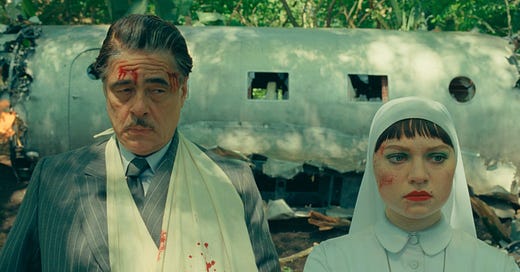The Phoenician Scheme: The Most ‘Wes Anderson’ Film Imaginable
On The Phoenician Scheme, by Wes Anderson.
The Phoenician Scheme’s cast is so ridiculously dazzling that it makes you wonder if Anderson was trying to impress us into seeing it. He has assembled an all-star ensemble that includes Benicio del Toro, Tom Hanks, Scarlett Johansson, Benedict Cumberbatch, Michael Cera, Bill Murray, Willem Defoe … Should I continue? But of course, the standout performance in any Wes Anderson film is what we have come to call ‘the aesthetic’: that perfect symmetry, those flat-space camera moves, the planimetric framing that brings to mind a child lining up toys on a shelf. There is the sweet-shop colour palette, the archetypal costumes, the deadpan dialogue. Gifted (cursed?) with such a distinctive style, the challenge that faces Anderson is avoiding self-parody. This was true even before the explosion of what have become the two most boring words in the English language: artificial intelligence.
To the story. Anderson’s latest flick is set in a fictional 1950s Middle East (because of course). Anatole ‘Zsa-Zsa’ Korda (del Toro) plays a magnate entangled in a series of back-room infrastructure deals and apt to be on the more painful end of attempts at assassination. But he is a man with a talent for surviving. In the opening scene, as the side of his biplane plane is blown off, he remarks, ‘Myself, I feel perfectly safe.’ (This is one of his catch-phrases.) Heedful that at some point, one of his assassins might get it right, Zsa-Zsa summons his estranged daughter, Sister Liesl (Mia Threapleton), a nun whose moral clarity and calm stand in stark contrast to Zsa-Zsa’s plutocratic and psychopathic worldview. Their relationship is the film’s emotional core. When the world’s governments get together and conspire to put an end to Zsa-Zsa’s business practices, Zsa-Zsa, with Liesl and entomologist and assistant Bjørn (Michael Cera), sets off to attempt to swindle his investors (Hanks, Johansson, Cranston, Cumberbatch).
Not that the plot really matters.
There are at least three thematic threads that run through the film, the first of which has to do with that gift that keeps on giving: the destructive character of capital. Zsa-Zsa is the plutocrat par excellence. He has no passport, has almost certainly killed at least one of his wives, and can do more or less what he wants. Capitalism here is presented as theatre: a great show of tailored suits and grave conversations that keep the money-sludge moving to no useful end. The world of wealth is ornate and hollow. It isn’t the most original subject, I agree: but Anderson brings the pastels and the laughs.
More striking, I think, is how the film grapples with the question of redemption. Liesel is of course a nun, and her father is a conscience-free villain who, from time to time, during certain near-death experiences, briefly finds himself in a cloud-filled afterlife (Bill Murray plays God). Anderson doesn’t go in for dogma, using religion here as a counterpoint. And yet the film is undeniably religious in a sense – not just because Zsa-Zsa worships money, but because it quite literally sets the quiet, unsettling force of faith against the noisy, clanking machinery of power. Unlike the oil barons and diplomats that Liesl meets, she does not need to speak up to command attention. She has presence; her silence is indictment. When she does speak, her words are spare, almost liturgical. They carry a moral weight that the other characters try to buy, bury, or broker away. Liesl represents not just a person of faith, but the intrusion of faith into a faithless world. Her arrival throws the moral indifference of the story off kilter. Zsa-Zsa’s is a theology of money – absolution through transaction, as it were, eternal life through worldly legacy. Liesl shows the essential worthlessness of such a worldview. Perhaps it is a stretch to say, but there is also a sort of visual theology at work as well. The framing brings to mind religious icons.
Then there is the question of control, or rather an indictment of the notion that such a thing exists. Zsa-Zsa thinks he can orchestrate everything. But the film repeatedly punctures this illusion. Sudden bursts of violence, bizarre detours, characters who won’t behave – these call into question the notion that we can engineer the world to our ends. And this is shown aesthetically, for the film, though visually in perfect order, has anarchic internal workings. There is a dissonance here, typical of Anderson, between form and function, the appearance of order and the chaotic reality. And it is in and through these contrasts that the film finds full thematic expression.
Which sounds terribly earnest. But The Phoenician Scheme is in fact very, very funny. Wes Anderson’s films are almost always amusing just because he plays it straight. The characters say silly things with perfect seriousness. The contrast, again, does the work: the characters never laugh. They never even smile. They maintain the same flat tone even as the world collapses around them:
Cousin: Who shot you?
Zsa-zsa Korda: Terrorists from out of town. Help yourself to a hand grenade.
Cousin: You're very kind.
The Phoenician Scheme gets funnier as it becomes more complex and more intellectually serious. It is as if a spy drama were written by a bright but rather lonely child. Which follows: in Anderson’s films, it is the children who are clever and brave and decent. The adults tend to be bad or useless.
Asked once why he insisted on hiding part of Tom Hardy’s face in his films (The Dark Knight Rises, Dunkirk), Christopher Nolan replied that ‘what [Hardy] does with single-eye acting is far beyond what anyone else can do with their whole body.’ With Benedict Cumberbatch, it is all in the voice. He appears for a short period (and with a fierce beard) mainly to say silly things in that mellifluous baritone and then take part in a silly chase around a building. But it is more cameo than part. The same is true for Johansson and Wright, who appear like stylised interruptions, radiating star power in a film whose cast list seems longer than its plot. Still, the interruptions are welcome.
So, what’s off with the film? Something, after all, is always off. Well, as I touched on before, the plot is so unnecessarily complicated that one doesn’t really need to bother with it and I suspect most will just stop following it half an hour in. And then there is the question whether Anderson, furnished with such gifts, does overcome the challenge of self-contraception, lest his film end up looking like it was spat out by a chatbot. The truth is that the visual grammar of the film is almost too perfect. It is the most Wes Anderson of Wes Anderson’s films in every respect. If there is such a thing as ‘Wes Anderson fatigue’, this is a film that risks inducing it.
But in the end, it doesn’t. It mainly induces laughter. Because this film really is funny – probably Anderson’s funniest since The Grand Budapest Hotel, which has this unforgettable sequence:
Henckels: By order of the commissioner of police, Zubrowka Province, I hereby place you under arrest for the murder of Madame Céline Villenueve Desgoffe-und-Taxis.
M. Gustave: I knew there was something fishy. We never got the cause of death. She's been murdered, and you think I did it.
[runs away]
But perhaps you have to see it. The distinct thing about The Phoenician Scheme is it combines more-or-less constant humour with moral weight. As well as being one of Anderson’s funniest films, it is also one of his more grown-up. It is intellectually suggestive, rather than on the nose, which I suppose will open it to the charge of being insubstantial. But it grapples with big ideas without ever sliding into earnestness, and in any case, you can’t please everyone. Personally, I loved it.






Interesting that you found it so very, very funny. The only moments that were funny for me were because of Michael Cera being hilarious. All other jokes gave me a sense of when an older person is trying to be funny, dry or cool and it just being cringey - not in a funny way but in a kind of embarrassing way.